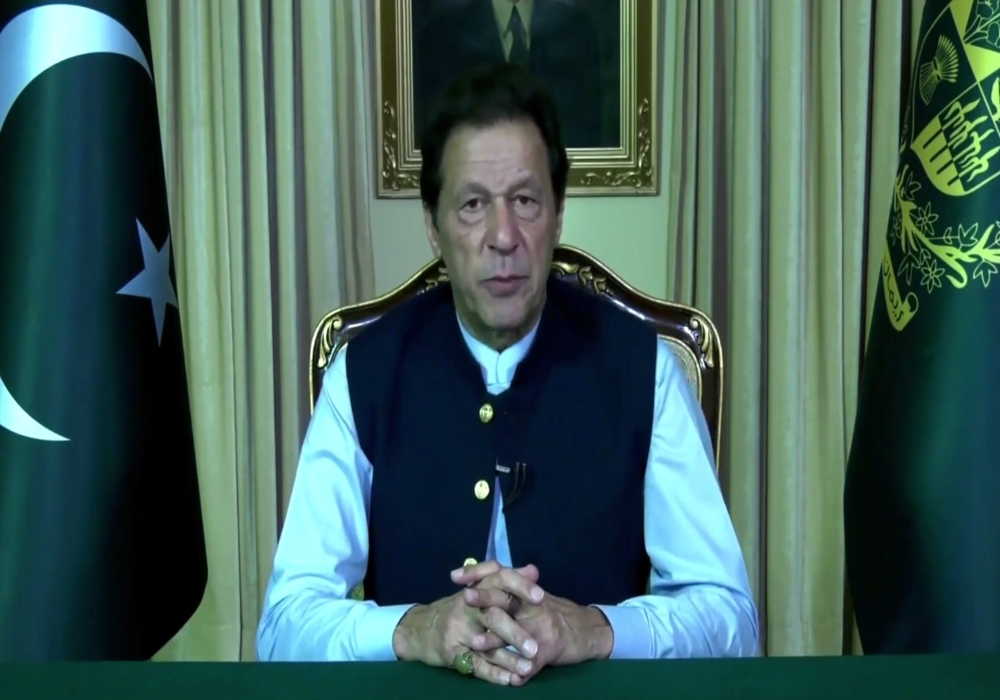

Prime Minister of Pakistan, Imran Khan
<p>
The Financial Action Task Force&rsquo;s (FATF) should &ldquo;black list&rdquo; Pakistan until it ends its proxy war in Afghanistan says former Canadian cabinet minister Chris Alexander in his report, titled &ldquo;Ending Pakistan&rsquo;s Proxy War in Afghanistan&rdquo;. The study has been published by Macdonald Laurier Institute (MLI), drawing on Alexander&rsquo;s field experience in the turbulent AfPak region. The diplomat was the first resident Canadian ambassador to Afghanistan from 2003-2009</p>
<p>
This report &ldquo;reveals&rdquo; the integral role of Pakistan&rsquo;s Inter-Services Intelligence (ISI) as the principal and underlying cause of persistent war against Afghans and those who seek to help them.</p>
<p>
The report points out that Pakistan helped to bring the Taliban to the negotiating table in Doha, Qatar but stopped to play an active role thereafter. Rather than pushing the Taliban for an outright reduction in use of the force, Islamabad, instead opted to tacitly support the Taliban&rsquo;s bargaining position to enter into a cease-fire only on certain conditions, including further concessions by Kabul, and the departure of U.S. troops.</p>
<p>
Experts believe that by bringing the Taliban to the table without convincing them to reduce violence, Pakistan sold the Trump administration a car without an engine. For example, one of the requirements of the so-called peace deal was that the Taliban would not only sever its relationship with the trans-national jihadists such as Al-Qaeda, but also renounce such association.</p>
<p>
But in Afghanistan, violence has spiralled worsening the faltering pace of peace negotiations between the Taliban and the Afghan government, thereby jeopardising a potential settlement that would stop country&rsquo;s decades of bloodshed.</p>
<p>
Alexander says that the Taliban and their allies have received unstinting support from Pakistan&rsquo;s military for decades. This state terror as statecraft has systematically resulted in the Taliban&rsquo;s capacity to continue engaging in terrorist activities. As a result, &ldquo;ISI&rsquo;s covert proxy war has killed a total of about 124,000 people to date more than half of them Taliban fighters and nearly one third Afghan civilians,&rdquo; notes Alexander.</p>
<p>
Those responsible for the continuation of Pakistan&rsquo;s proxy war in Afghanistan have not been held to account. This has enabled the impunity enjoyed by Pakistan&rsquo;s military leaders.</p>
<p>
Alexander makes 10 recommendations, including calling on Pakistan to end its covert proxy war at the UN, sanctioning officials responsible for supporting terrorist organizations. He also advocates ensuring that states enact wide-ranging sanctions against Pakistani officials supporting the Taliban, Al-Qaeda, the Haqqani Network, and other terrorist groups operating in Afghanistan and revise the United Nations Consolidated List of entities subject to measures imposed by the Security Council.</p>
<p>
The report stressed that Pakistan must remain listed as an official state sponsor of terrorism and added to FATF blacklist until it ends its covert proxy war in Afghanistan.</p>
<p>
For years Pakistan&rsquo;s political and military leaders swore that no Taliban leader had ever set foot in their country. It was a prodigious lie. When the Taliban, with comprehensive support from Pakistan&rsquo;s military, ramped up operations over 2005-06 into a full-blown offensive threatening to overwhelm Afghan government defences and seize provincial capitals, Pakistan&rsquo;s former President Pervez Musharraf, under increasing US pressure, kept lying.&nbsp;</p>
<p>
The truth is that Pakistan has never, then or later, moved against its Taliban proxies. In this regard Pakistan&rsquo;s policy of proxy war, as managed almost entirely by the ISI, has been utterly consistent: Pakistan&rsquo;s security forces have never sought to reduce the Taliban&rsquo;s capabilities to launch attacks in Afghanistan.</p>
<p>
From Benazir Bhutto&rsquo;s second term as prime minister, when the Taliban was formed, through Nawaz Sharif&rsquo;s first term, during Musharraf&rsquo;s coup, military rule, and brief stint as a civilian president, right down to the more recent governments of Asif Ali Zardari, Nawaz Sharif&rsquo;s second term, and now Imran Khan, the Taliban and their allies have received unstinting support from Pakistan&rsquo;s military, the report concludes.</p>
<p>
It has been one year since the United States and the Taliban signed the &lsquo;Agreement for Bringing Peace to Afghanistan&rsquo; and since then there has not been any consensus on how to bring about that peace.</p>
<p>
Despite the continuing carnage and bloodshed, something far deadlier, brews beneath the surface, as the Taliban, the Haqqani Network, al-Qaeda and the Islamic State erase logistical boundaries between their organisations. Despite certain ideological differences these terrorist groups, they enjoy the fruits of overlapping loyalties, shared military commanders, patronage of the Pakistani state and a deal with the US that allows them to get away with murder.</p>
<p>
Alexander points out that the peace process in Afghanistan under President Ashraf Ghani is fading out, and what is considered an &ldquo;endless war&rdquo; has a &ldquo;single underlying cause: Pakistan&rsquo;s Inter-Services Intelligence (ISI) is waging a covert proxy war in Afghanistan. Pakistan&rsquo;s aim is to break Afghanistan&rsquo;s post-2001 constitutional order by installing a Taliban-led coalition to replace the current government, which ISI sees as a stalking horse for India&rdquo;.</p>
Taiwan's Armed Forces staged a powerful demonstration of military readiness on Saturday, simulating a Chinese…
In a significant milestone for global healthcare innovation, the World Health Organization (WHO) has released…
The Balochistan Liberation Front (BLF) has claimed responsibility for a sweeping wave of armed assaults…
Union Minister of State for External Affairs Pabitra Margherita reaffirmed the "strong and enduring bonds…
Prime Minister Narendra Modi on Saturday distributed over 51,000 appointment letters to newly appointed youth…
Union Health Minister and BJP National President JP Nadda engaged with the Chairman of the…